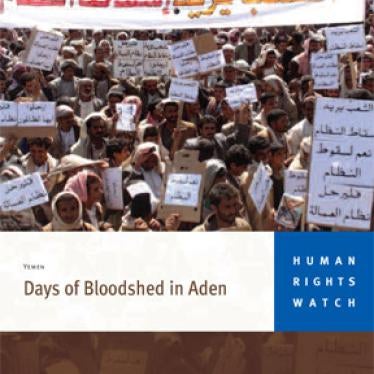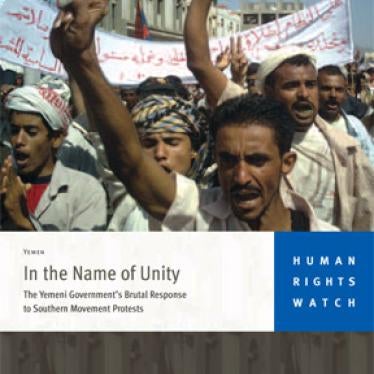(New York) – Yemeni security forces repeatedly used excessive, deadly force on largely peaceful protesters in the southern city of Aden in February 2011, Human Rights Watch said in a report released today. Security forces fired weapons that included assault rifles and machine guns at the protesters, killing at least nine and possibly twice that number, and injuring more than 150, some of them children.
The 20-page report, “Days of Bloodshed in Aden,” documents attacks on protesters in the strategic port city of Aden from February 16 to 25. Human Rights Watch found that police and military forces also chased and shot at protesters trying to flee the assaults. The forces stopped doctors and ambulances trying to reach protest sites, fired at people who tried to rescue victims, and removed evidence, such as bullet casings, from the shooting scenes.
“Shooting into crowds is no way to respond to peaceful protests,” said Joe Stork, deputy Middle East and North Africa director at Human Rights Watch. “Governments in the region and beyond should make clear to Yemen that international assistance comes with the condition of respecting human rights.”
The Yemeni authorities should immediately end these illegal attacks and conduct an impartial investigation into the injuries and deaths in Aden, Human Rights Watch said.
The report is based on more than 50 interviews with injured protesters and witnesses to the killings, relatives of protesters who were killed, doctors, paramedics, and human rights activists. Human Rights Watch also analyzed video and photo materials that witnesses to the protests provided, as well as hospital records and ballistic evidence that protesters collected after the shootings.
Since 2007 Aden has been the center of protests in Yemen’s southern provinces, where inhabitants are seeking increased economic opportunities and political autonomy or secession. The South was a separate republic until it unified with the North in 1990. On February 3 protesters in Aden and other parts of the South joined calls across Yemen for an end to the government of President Ali Abdullah Saleh.
In Aden, security forces have systematically attempted to prevent large protests, although they have allowed them in the capital, Sanaa, since February 22. Nevertheless, groups of several hundred people have protested against President Saleh in various neighborhoods of Aden almost daily since February 15.
Government officials blamed the Southern Movement for the bloodshed. The movement is a loose coalition that has been leading both the protests in the South since 2007 and the more recent demonstrations in Aden against Saleh.
Human Rights Watch found in Aden that security and intelligence forces, including members of Central Security, the general police, the army, and the National Security Bureau, routinely used lethal force that was clearly excessive in relation to the danger presented by the protesters. In all cases Human Rights Watch documented, security forces used teargas, rubber bullets, and live ammunition, including from assault rifles and machine guns.
Numerous witnesses described the protesters as unarmed and stated in most cases that the protesters presented no threat to others or to surrounding property. Some of the protests were entirely peaceful. During others, protesters threw stones as security forces tried to disperse them.
The majority of victims were young men and boys. Human Rights Watch documented the killings of three boys – two 17-year-olds and one 16-year-old. Many of the injured were children as well. Human Rights Watch also documented several cases in which security forces killed or wounded bystanders. One man was hit and killed by a bullet as he observed the protests through the window of his home.
Security forces quickly removed bullet casings from the streets, and authorities forced families to bury the bodies of those killed immediately, in an apparent attempt to suppress evidence and to prevent massive public funeral processions. In at least one case, the authorities forged a forensic report of a person killed in a protest.
The exact number of those killed and injured during the attacks in Aden remains unknown. Authorities did not release information on casualties and prevented independent observers from reaching government hospitals. Many of those who were injured did not go to the government hospitals after learning that security forces were entering them and arresting injured protesters, and the capacity of private hospitals was overstretched.
Yemeni security forces detained dozens of peaceful protesters and Southern Movement activists in Aden during the same period, Human Rights Watch found. Some detainees were released, but Human Rights Watch documented at least eight cases in which Southern Movement and activists “disappeared” after being detained.
Human Rights Watch documented the same patterns of use of excessive force by Yemeni security forces against southern protesters in its 2009 report “In the Name of Unity.”
“The recent killings and injuries are the latest chapter in President Saleh’s brutal attempts to stifle legitimate dissent in Aden and surrounding areas,” Stork said. “Instead of forging unity, these unlawful attacks risk driving a further wedge between the government and the people of the South.”








